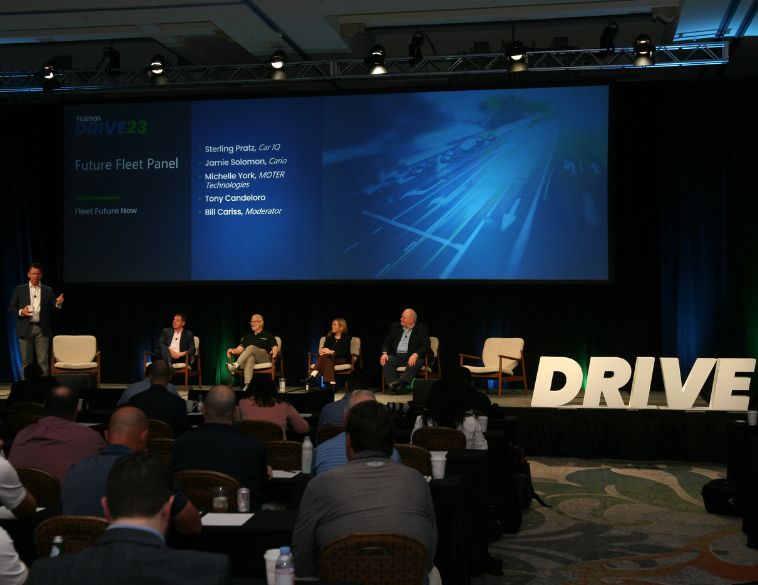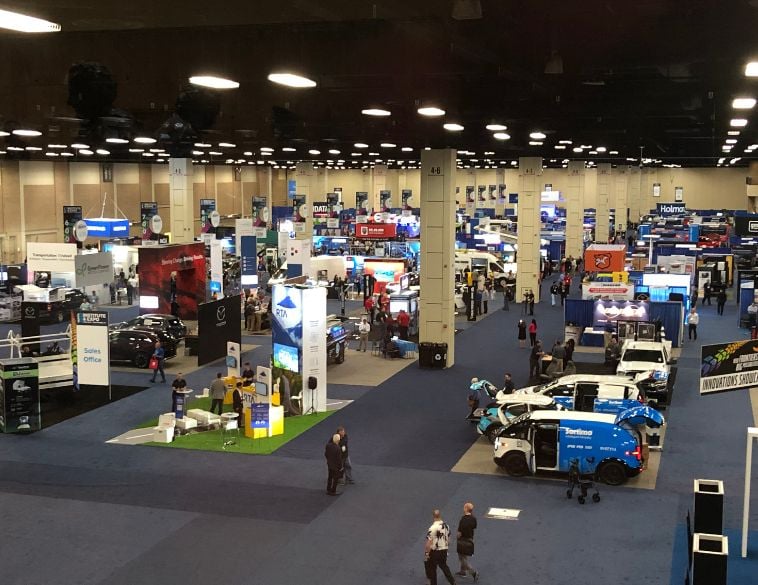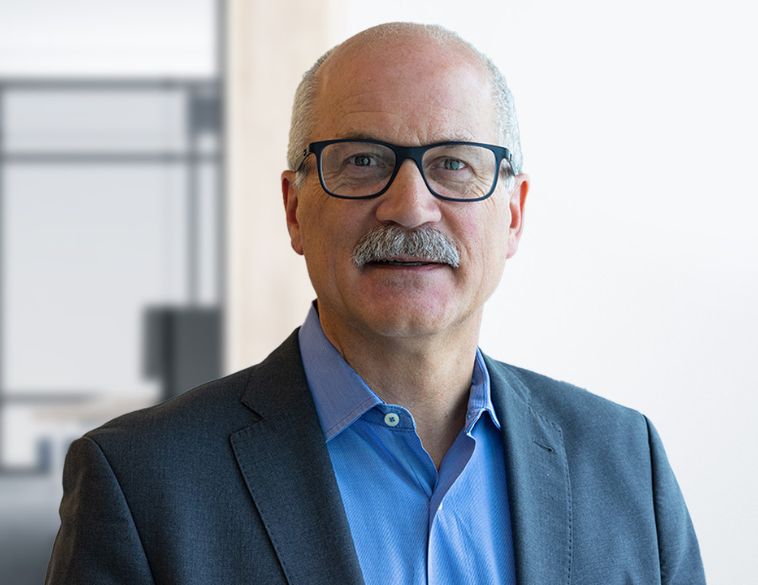In our second and final installment covering Holman Drive 2023 (see part 1), we look at sessions that focus on leveraging the power of technology to enhance the customer experience, as well as the importance of leadership and culture.
To say that Holman Drive 2023 was chockfull of insightful and informative content, was perhaps an understatement. From discussions on digital transformation, to future fleet predictions and analysis, as well as leadership takeaways from a highly successful CEO, there was a lot to help fleet managers in running their business and working with partners like Holman that can help take their operations to the next level.
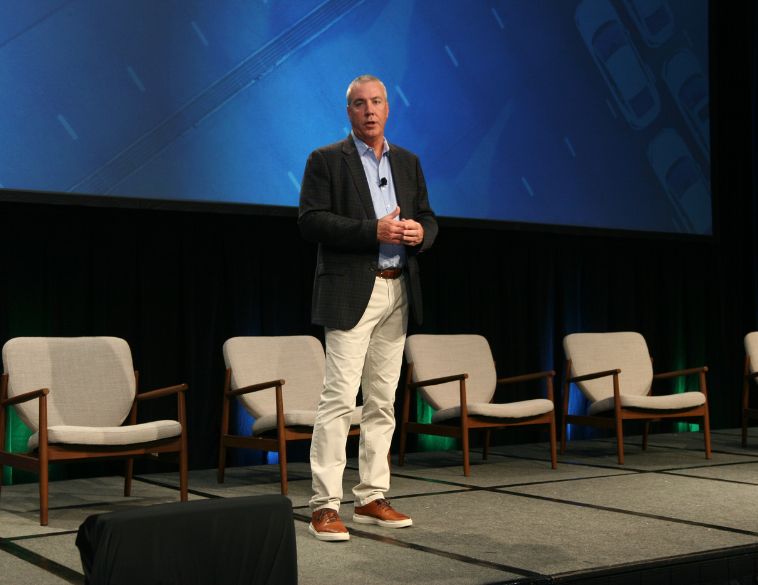
Harnessing the power of digital
A Digital Transformation Trends panel, moderated by Craig Pierce, Senior Vice President, Sales at Holman, featured Jarrod Phipps, Chief Information Officer, Holman; Phil Nanus, Executive Vice President, Customer Success, Salesforce; Chad Saliba, Associate Vice President, Solution Marketing, Geotab and Michael Stallone, Vice President, Application Development, Holman, discussed how “digitization” is impacting everyone, and ways in which organizations such as fleets can successfully navigate through this fast-evolving landscape.
Phipps discussed the importance of creating an amazing employee experience in the digital age, since doing so helps create an amazing customer experience. He noted that in a service-focused business, like Holman, there are a million different ways to deliver that amazing experience, the key is leveraging digitization and the technology available through it to deliver a simple and seamless client experience. He noted that employees and customers alike now expect technology to work like their favourite apps and social media platforms, in other words having everything they need at their fingertips in order to take action. Phipps also discussed how the democratization of information is providing fleets with new opportunities enabling them to make decisions based on fast, accurate data analysis, benefiting both their businesses and their customers.
Phil Nanus noted that given the huge amount of data being generated today, a major challenge is being able to effectively harness it. “A lot of that data is disconnected,” he said, “it might be on a random server, a spreadsheet or on somebody’s laptop,” meaning it is not being used and properly aggregated to take advantage of new solutions available to organizations such as machine learning tools that can allow them to tailor experiences to individual customers based on rich, reliable data on those clients’ preferences and requirements. Nanus explained that in cases where you have lots of customers, many with very different requirements, you want to make sure that you can tailor services and requirements as best as possible to each individual client.
One of the key methods of doing this, he said, is to have a three-pillar approach, firstly, are those clients using the right functions and features of the technology to help achieve their business goals? Secondly, do they have the right areas of expertise and are properly trained in the technology? Third, how are those customers implementing the technology in their organizations and does that implementation stay healthy over time?
Nanus also explained that a big trend that is happening today, is the blending of sales and service and how more advanced AI technology is helping organizations make more informed, data-based decisions, which in turn improves customer relationships and in turn their business.
Mike Stallone talked about Holman’s partnership with Salesforce and how such collaboration can enhance customer service functions within the organization. “Whether it’s case management or follow-up, we’re able to aggregate our knowledge systems and bring them all together.” He noted that the result tends to be a more efficient way in which to solve problems, streamline processes and as a result create a better overall experience for the customer.”
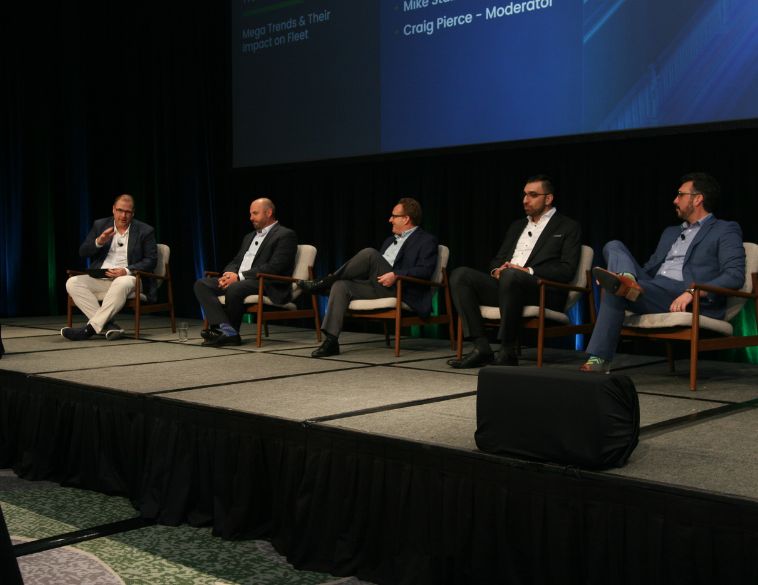
Managing the data
Chad Saliba said that in the last two decades, the amount of data being generated for fleets has exploded and today, Geotab is collecting more than 75 billion data points each day. There is literally so much of it being generated that it can be a challenge to properly utilize it, which is why it’s so important for companies like Geotab to help their customers make sense of all this data and properly harness it for their own fleet operations. Jarrod Phipps explained that in Holman’s case, a partnership with Geotab has been a win-win since it allows Holman to gain some very clear insights and leverage that information and telematics data to ensure vehicles are performing efficiently and safely on the road, which ultimately, is what every fleet wants.
Sticking with customer service and specific needs, Bob White, President, Holman Fleet & Mobility, talked about being 100% Focused on Your Fleet, and outlined that the level of customer service often hinges on defining what that service is. White referred to the concept of exceeding expectations, citing a famous restaurant in New York City where the concept of taking ordinary things that a business does for their customers and turning them into extraordinary experiences hit a new level. One day, a customer was at the restaurant stating that they had never had an authentic New York City hot dog. So, the owner of the restaurant decides to head out and buy a hot dog from a local street vendor, bring it back into the business and serve that hot dog to their customer. To this day, the reaction from that customer to this unexpected experience ranks as one of the best and most impactful ever.
Relating back to the fleet management sector, White said that creating industry-leading solutions and service is what helps drive Holman’s customers forward, being that dependable partner that is there day in, day out in helping fleets, not only with their daily operations and individual transactions but also on their strategic objectives, resulting in a seamless partnership that’s able to leverage the latest technology and solutions to drive both growth and excellence. “Whether it’s through service investments, new technologies, or just new ways to reduce all the noise and complexity, we, [at Holman] are 100% focused on making it easier for you and your teams to work with us,” stated White.
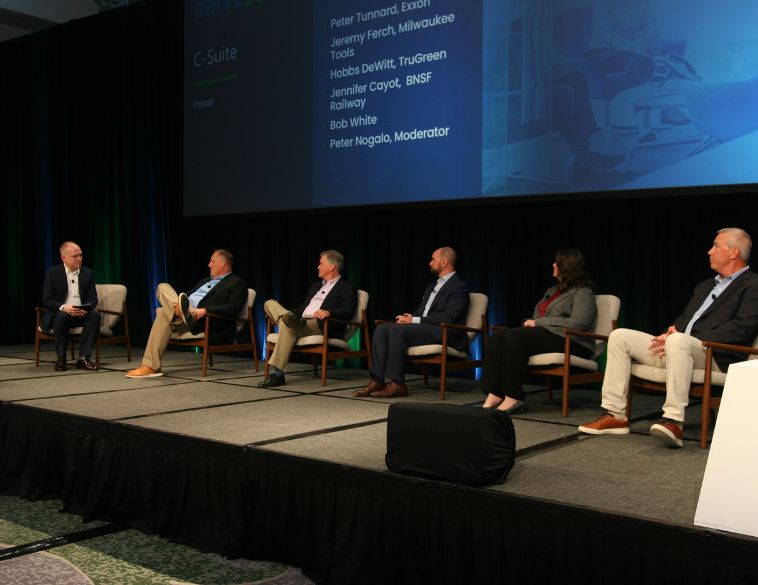
C-Suite considerations
Another interesting session was Lessons from the C-Suite, a panel discussion that was moderated by Peter Nogalo, Manager, Industry Relations, Holman and featured Jennifer Cayot, Director, Strategic Sourcing, BNSF Railway; Jeremy Ferch, Vice President, Finance and Senior Vice President, Milwaukee Tool; Peter Tunnard, Regional Manager, ExxonMobil; Hobbs DeWitt, Vice President, Supply Management, TruGreen; and Bob White.
Ferch said that prior to the COVID-19 pandemic, fleet operations weren’t often considered to be top of mind among executives at the C-Suite level in organizations, but the disruption caused by government shutdowns and the impact that had on vehicle availability and demand quickly underscored just how important fleet management was in many cases.
All of a sudden, processes that seemed routine were now challenging, as organizations did their best to ensure they had vehicles available and operating effectively to deliver the right service to their customers. Ferch’s comments were shared by Hobbs DeWitt and Peter Tunnard, the latter noting that as far as the oil and gas industry is concerned, COVID represented an “elevating moment” for fleet operations, whereby every aspect, such as operational and acquisition costs, as well as asset lifecycle was now top of mind among C-Suite senior management teams. “I think we are in a better place now in talking about fleet than we were in the last 10-15 years,” said Tunnard.
Jennifer Cayot said that the pandemic changed priorities for BNSF, requiring the organization to take a more hands-on approach to fleet operations since some of its vendor partners and service providers simply weren’t able to provide the services required.
At TruGreen, Hobbs DeWitt said a key priority is customer service, especially given that the company has around 9,200 vehicles servicing 2.5 million clients. “It is absolutely critical that we engage in conversations to have the right vehicle in the right place at the right time,” he said, while also focusing on another key driver at TrueGreen, namely Environmental and Social Governance (ESG) objectives. Therefore, in working with a partner like Holman, the mission is to reduce the environmental impact of fleet operations, while at the same time being able to efficiently control operating expenses.
Ultimately, the panellists concurred that today, the fleet is and should be recognized as a key part of every business and executives need to work with their fleet management teams and those fleet organization partners to ensure efficient operation, manageable costs and deliver superior client experience no matter the industry and market in which they operate.
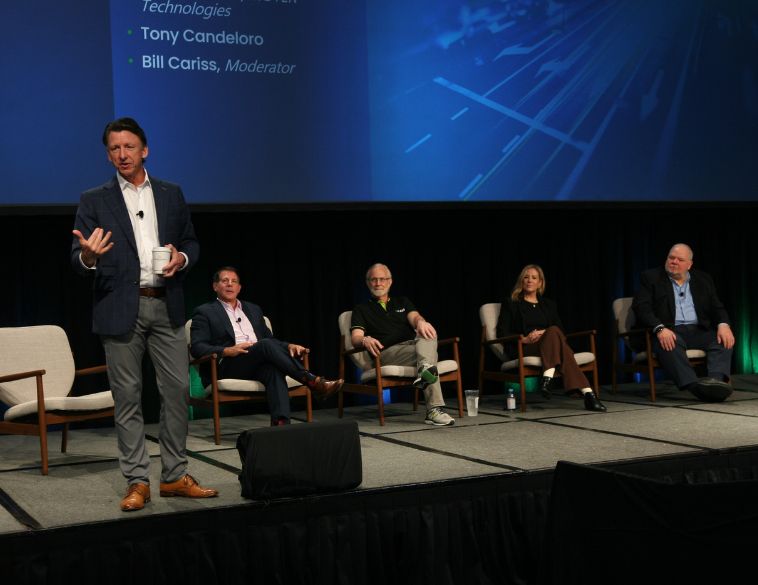
Transformation via technology
Another panel session, entitled Future Fleet Today, delved into the latest fleet-related technologies and how Holman, through initiatives like its Strategic Ventures and the startups it partners with, can help fleet organizations stay competitive and relevant both today and tomorrow. Hosted by Bill Cariss, President & CEO, Holman Strategic Ventures, the panel featured Tony Candeloro, Senior Vice President, Platform Management and Design at Holman; Sterling Pratz, CEO CarlQ; Jamie Solomon; Executive Vice President, Blockchain for Cario and Holman; Michelle York, Chief Underwriting Officer, MOTER Technologies. The audience got to hear about how each of these organizations is transforming everyday aspects of fleet vehicle operations from property and casualty insurance to fleet fuel cards, to digitizing vehicle documentation and titles.
Each of the panellists not only provided an overview of their product offerings but also how they are leveraging the power of advanced technologies, in Cario’s case, Blockchain to provide efficient and accurate vehicle records; how MOTER is using AI through connected vehicles to create the right insurance products for fleets and, via telematics, and fintech, CarlQ is redefining the way fuel and propulsion solutions are conducted in the fleet management space. It was interesting to listen to each pitch and gain insight into what is happening at the bleeding edge of technology as it relates to vehicle fleet management.
The final keynote of the event came from Jeff Immelt, former Chairman & CEO of General Electric. In this session, Immelt shared his experiences in being at the helm of a major global conglomerate, navigating and leading through change and disruption and the takeaways that can help others do the same. He talked about cycles, good times and bad times, something that everyone and every organization goes through. He noted the most important thing as a leader, are three key things.
First, how good, effective leaders and companies act, second, properly dealing with change down to an operational level and third, learning from the mistakes that are made. “All of us have an opportunity to learn from each other and continue learning every day,” Immelt stated.
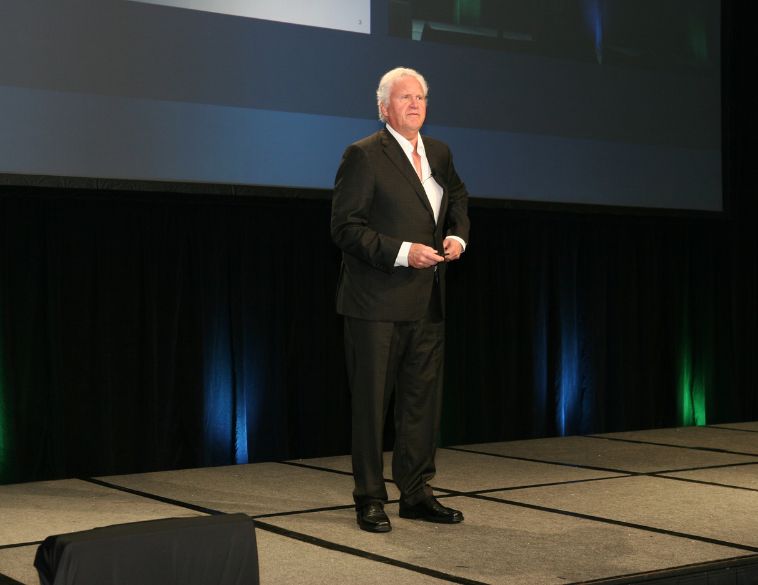
Change, leadership and disruption
For the last several years, Immelt has been teaching second year business school students on change, leadership and disruption. For each class, he brings a CEO to talk with the students. These chief executives come from all kinds of organizations, large and small, public, and private and he notes that among the 100 CEOs and company founders he has interviewed for these classes, four things stand out. Firstly, they value competency, secondly, they value work and execution. Thirdly, they focus on winning through each cycle, and finally, they pick and connect the right people to create an effective culture.
Having spent time in Silicon Valley recognized as the hotbed of innovation in the business world, Immelt said that a key thing he learned was that people there do not talk about status or the organization they work for, they talk about ideas and products, focusing on delivering solutions to real-world problems. Immelt noted that for the last 20 years, many people in the business world have not been doing that, instead they’ve been focused on conducting acquisitions and deals, which can lead to stagnation, complacency, and lack of competitiveness. He said that in reality, it is far better to be an operator first and an investor second, than the other way around.
“The best companies in the world are built on ideas and the COVID-19 pandemic reinforced that, with organizations required to pivot and think quickly on their feet in order to deal with a monumental amount of disruption coming at them in a very short time. He referred to the fact that the lack of availability of a simple part, such as a semiconductor had the ability to almost shut down the entire automotive industry and today, we’re still feeling the effects of those parts shortages.
Immelt noted that unconventional times call for unconventional thinking and that the best companies and leadership teams keep moving forward, no matter what is being thrown at them. He said you can really judge the performance of your management teams on the worst days, by seeing what they’re truly made of, which is why it is so important to pick the right people to work on your team. “Strong cultures are really built on fit, bringing together the right group of people.” Effective leaders he said, are “orchestrators of talent, they know how to build different operations and know that not everybody is built the same.”
Immelt went on to talk about the three types of people that are key to having a successful culture and organization, namely builders, operators and integrators. The builders are the ones who are willing to rock the boat and take risks. The operators are those who keep things on track and make up for the builders’ mistakes, while the integrators are those who can help manage change and interaction, by bringing the whole team together. “If you don’t have enough of all three, your organization is going to suffer,” explained Immelt.
For fleets, he noted that some of the biggest issues currently facing the industry are the push towards electrification, increased operational costs, access to capital and leveraging the power of technology to manage all the data that’s being generated through AI, telematics and connectivity.
Immelt said that while there is currently a lot of hope around AI and machine learning, where it will make the biggest impact is by making workers more productive and giving them better tools to help them get the job done. Ultimately, he noted the key to being successful in business long term is the ability to solve problems properly and efficiently and do so with purpose.
“Leaders have a purpose,” Immelt said. “Leaders respect work; leaders pull teams and cultures together through cycles like EVs and financial services [we’re currently experiencing]. If you manage that change,” declared Immelt, “it’s going to be great,” but he noted, that it doesn’t mean you have the option of standing still, because you don’t. Ultimately, he said, it’s about asking the right questions. “Don’t be discouraged by your own mistakes, instead, focus on building trust with your peers and moving [forward] quickly.”

